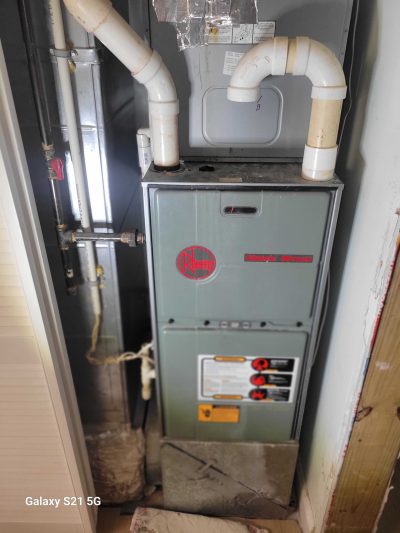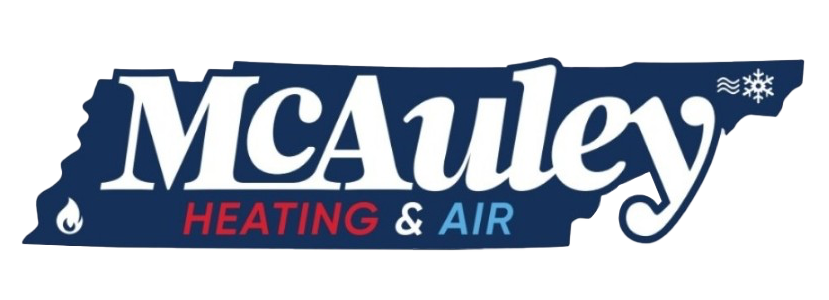How Heat Pumps Work and Why They Are Ideal for Year-Round Comfort
McAuley Heating and Air
Understanding Your Heat Pump
When it comes to keeping your home comfortable year-round, heat pumps offer an incredibly versatile and efficient solution. Unlike traditional heating and cooling systems that rely on separate units for summer and winter needs, heat pumps can provide both heating and cooling in one system.
This dual functionality makes them an ideal option for homes in moderate climates like Knoxville, where temperatures fluctuate between warm summers and cool winters. In this blog, we’ll explain how heat pumps work, why they are a smart investment for year-round comfort, and how they can help you save on energy costs.
*Conditions apply, ask for details.
How Do Heat Pumps Work?
A heat pump works by transferring heat rather than generating it. This process is key to its efficiency. Depending on the season, a heat pump moves heat into or out of your home to maintain comfortable temperatures.
Cooling Mode
In the warmer months, a heat pump operates similarly to a traditional air conditioner. It removes heat from the inside of your home and releases it outdoors, cooling your home in the process.
Here’s how the cooling process works:
- Evaporation of Refrigerant: The indoor unit absorbs heat from the air inside your home using refrigerant. As the refrigerant evaporates, it turns into a gas, pulling heat away from the indoor air.
- Heat Transfer Outdoors: The refrigerant is then compressed, increasing its temperature as it moves to the outdoor unit. Once outside, the refrigerant releases the absorbed heat.
- Re-circulation of Cooled Air: After the heat is released outdoors, the cooled refrigerant returns to the indoor unit, where it cools the air again, and the process repeats.
This continuous cycle keeps your home cool and comfortable, just like a conventional air conditioning system.
Heating Mode
What makes heat pumps truly unique is their ability to reverse this process to heat your home during colder months. Instead of extracting heat from inside the house and moving it outdoors, a heat pump pulls heat from the outdoor air and transfers it inside.
Here’s how the heating process works:
- Absorbing Heat from Outside: Even when it’s cold outside, there’s still some heat in the air. The heat pump captures this heat using refrigerant, which absorbs the outdoor warmth.
- Heat Transfer Indoors: The refrigerant is then compressed to increase its temperature and transferred inside, where the heat is released into your home’s air.
- Warm Air Circulation: The warm air is circulated throughout your home via ducts (or directly from the indoor unit in ductless systems), providing consistent and efficient heating.
This process makes heat pumps highly efficient because they don’t need to generate heat—they simply transfer it from one place to another. This ability to provide both heating and cooling makes them a convenient year-round comfort solution.
Types of Heat Pumps
There are different types of heat pumps, each suited to specific climates and homeowner preferences:
Air-Source Heat Pumps
Air-source heat pumps are the most common type and are ideal for moderate climates like Knoxville’s. They transfer heat between your home and the outside air, making them effective and energy-efficient for both heating and cooling.
- Advantages: Cost-effective, relatively easy to install, and work well in moderate climates.
- Considerations: Air-source heat pumps are less efficient in extremely cold temperatures, but newer models have improved performance even in freezing conditions.
Ground-Source (Geothermal) Heat Pumps
Ground-source heat pumps, also known as geothermal heat pumps, transfer heat between your home and the ground. Because the ground maintains a relatively constant temperature throughout the year, geothermal systems are incredibly efficient.
- Advantages: Extremely efficient, can reduce energy use by up to 50%, and have a long lifespan.
- Considerations: Higher upfront installation costs and more complex installation due to the need for underground piping.
Ductless Mini-Split Heat Pumps
Ductless mini-split heat pumps are great for homes without ductwork or for those looking to add heating and cooling to individual rooms or zones.
- Advantages: Offer zone-specific control, no ductwork required, and highly efficient for both heating and cooling.
- Considerations: Higher upfront cost per unit, but savings in energy bills can make up for it.
Benefits of Heat Pumps for Year-Round Comfort
Heat pumps are an excellent choice for homeowners looking for a single system that can handle both heating and cooling needs. Let’s dive into the specific benefits that make them ideal for year-round comfort, particularly in climates like Knoxville’s.
Energy Efficiency
One of the primary reasons heat pumps are so popular is their energy efficiency. Since heat pumps transfer heat instead of generating it, they use significantly less energy than traditional heating and cooling systems like furnaces or electric heaters. This efficiency leads to reduced energy consumption, which can lower your utility bills—especially during peak heating and cooling seasons.
- Efficiency in Cooling: When operating in cooling mode, heat pumps perform on par with central air conditioners, but with added energy efficiency features that can lead to cost savings.
- Efficiency in Heating: During winter, heat pumps are far more efficient than electric resistance heaters or furnaces that burn fossil fuels. For every unit of electricity used, heat pumps can generate two to three units of heat, making them more efficient.
For homeowners in Knoxville, where winters are relatively mild and summers are warm, a heat pump can provide significant energy savings throughout the year.
Consistent Comfort
Heat pumps provide consistent heating and cooling throughout your home. Unlike systems that turn on and off frequently, causing temperature fluctuations, heat pumps operate more smoothly, maintaining steady indoor temperatures. Variable-speed technology in many modern heat pumps allows the system to adjust output based on your home’s needs, ensuring optimal comfort.
- Cooling Mode: Heat pumps offer even and efficient cooling during the summer, keeping indoor temperatures comfortable and consistent.
- Heating Mode: In the winter, heat pumps provide steady warmth without the dryness that can sometimes result from forced-air heating systems like furnaces.
This consistency in comfort is especially appreciated in moderate climates like Knoxville’s, where the weather can change quickly, and you want a system that adjusts smoothly to maintain your desired indoor temperature.
Environmentally Friendly
Heat pumps are more environmentally friendly than many traditional HVAC systems because they use less electricity and don’t rely on burning fossil fuels like gas or oil furnaces. By using a renewable energy source (the air or ground), heat pumps help reduce greenhouse gas emissions and your home’s carbon footprint.
Additionally, many heat pumps use eco-friendly refrigerants that are less harmful to the environment compared to older systems that rely on ozone-depleting substances. Investing in a heat pump is not only good for your home but also good for the planet.
Lower Operating Costs
The long-term cost savings of installing a heat pump can be significant. While the initial installation cost may be higher than some traditional systems, the energy savings over time can make up for the difference. For example:
- Reduced Heating Bills: Heat pumps use less energy for heating compared to furnaces or electric resistance heaters.
- Reduced Cooling Bills: Since they operate efficiently in cooling mode, heat pumps can help lower your summer cooling bills.
- Lower Maintenance Costs: Heat pumps often require less maintenance than traditional HVAC systems since they consolidate both heating and cooling in one unit.
For homeowners in Knoxville who use both heating and cooling throughout the year, these reduced operating costs make heat pumps a smart long-term investment.
Dual Functionality
One of the biggest advantages of heat pumps is their ability to provide both heating and cooling in one system. Instead of maintaining separate heating and cooling units, a heat pump simplifies your HVAC needs by performing both functions. This dual functionality is particularly beneficial in climates like Knoxville, where you need reliable cooling during the hot summers and efficient heating during the mild winters.
By installing a heat pump, you can enjoy year-round comfort without the need for multiple systems, which also frees up space and reduces the complexity of your HVAC setup.
Is a Heat Pump Right for Your Home?
Heat pumps are ideal for homes in moderate climates like Knoxville, where extreme cold is rare. If you’re looking for an energy-efficient, environmentally friendly system that provides year-round comfort, a heat pump could be the perfect solution for your home.
At McAuley Heating and Air, we specialize in installing, maintaining, and repairing heat pumps. Our experienced technicians can assess your home’s specific needs and recommend the best heat pump system for your budget and comfort preferences.
Find Out if You Need a Heat Pump Today
Heat pumps are an ideal choice for year-round comfort in homes located in moderate climates like Knoxville. Their ability to provide both heating and cooling, combined with their energy efficiency, environmentally friendly operation, and long-term cost savings, make them a smart investment for homeowners. Whether you’re looking to upgrade your current system or install a new heat pump, McAuley Heating and Air can help.
Contact us today to schedule a consultation and learn more about how a heat pump can improve your home’s comfort and efficiency. Let McAuley Heating and Air help you stay comfortable in every season with a system that works for you, year-round!




